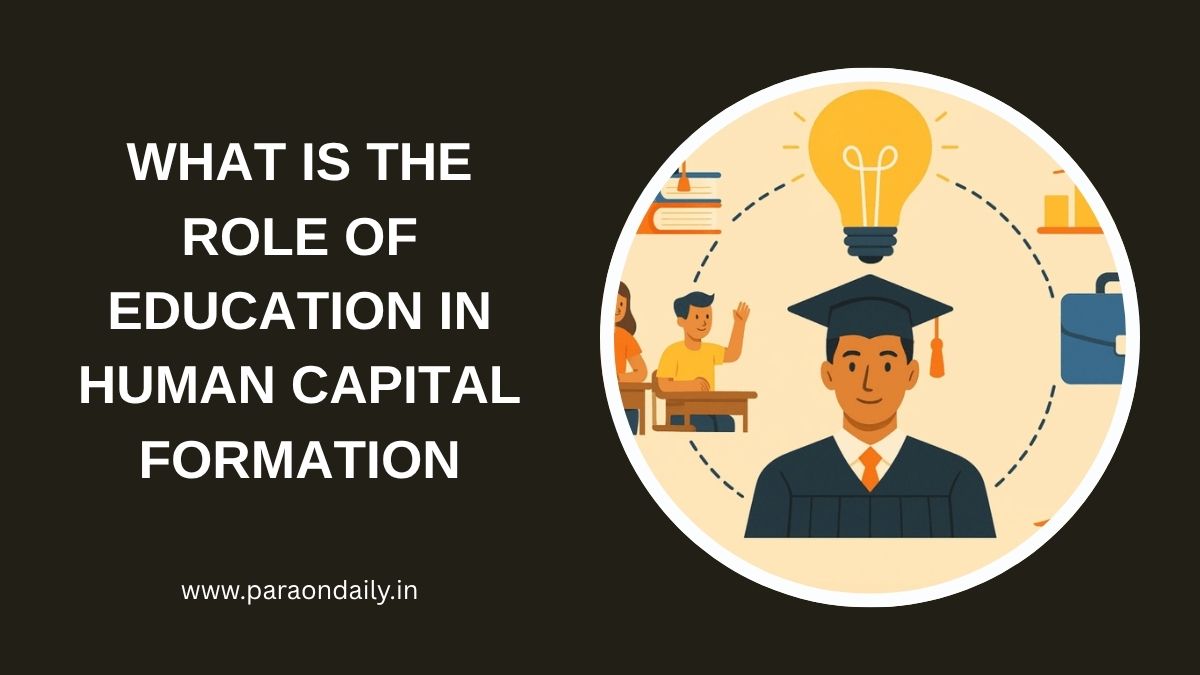Education plays a very important role in shaping a person’s life. It is the foundation for building knowledge, skills, values, and attitudes. In today’s fast-growing world, education is not just about going to school and getting degrees. It is much more than that. One of the key questions people ask is what is the role of education in human capital formation? Human capital means the knowledge, skills, health, and abilities that people use to produce goods and services. Education helps people become more skilled, confident, and capable. It increases their chances of getting better jobs and improving their standard of living.
In this blog, we will explain in a very simple and clear way how education helps in forming human capital and why it is important for every country.
What is Human Capital?
Human capital refers to the abilities, talents, and skills that people gain through learning, training, and experience. Just like machines and tools are used in factories to produce goods, human capital is used by people to do work in offices, schools, farms, hospitals, and many other places.
It includes:
- Education
- Technical skills
- Good health
- Experience
- Personal qualities like discipline and motivation
When people are educated and healthy, they become more productive. This means they can do more work in less time and do it better. That’s why every country wants to invest in human capital.
Also read: Which Service is a Student Who is Homeless Automatically Eligible for
Understanding Human Capital Formation
Human capital formation means increasing the number of skilled and educated people in a country. It is the process of developing people who can contribute to the economy through their knowledge and work.
It includes:
- Sending children to school
- Providing higher education and vocational training
- Teaching new skills to workers
- Promoting good health through healthcare facilities
When a country invests in its people, they become more skilled. This helps in the development of industries, services, and the overall economy. Education is the most important tool in this process.
What is the Role of Education in Human Capital Formation?
Let us now clearly understand what is the role of education in human capital formation through various simple points:
1. Improves Knowledge and Skills
Education gives people knowledge of different subjects like science, mathematics, languages, history, and technology. It also teaches life skills like communication, decision-making, and problem-solving. All these skills help people become better workers and professionals.
When a person learns something new, they become more useful at work. For example, a person trained in computers can work in IT companies, banks, or offices. So, education helps in creating a workforce that is skilled and efficient.
2. Increases Employment Opportunities
An educated person has more chances of getting a job. Companies look for workers who have proper education and training. People who are educated can apply for jobs in different fields like teaching, engineering, healthcare, business, and government services.
Even self-employment becomes easier for educated people. They can start their own businesses because they understand planning, marketing, and management. So, education opens many doors for earning money and building a career.
3. Promotes Economic Growth
When people are educated, they help in growing the economy. A skilled workforce can increase production in factories, improve services, and develop new technologies. This leads to more income for the country.
Developed countries like the USA, Germany, and Japan have strong education systems. That’s why they have highly skilled workers who make their economies successful. Education builds human capital, which in turn builds a strong economy.
4. Reduces Poverty and Inequality
Education helps people get better jobs and earn more money. This reduces poverty. When poor children get good education, they can improve their lives. It also reduces inequality in society because education gives equal opportunities to everyone.
Girls, people from backward areas, and underprivileged communities benefit the most from education. It helps them gain respect, confidence, and independence. So, education is a powerful tool for social change and fairness.
5. Supports Health and Well-Being
Education also helps people understand health, nutrition, and hygiene. Educated people take better care of their families. They visit doctors, eat healthy food, and maintain cleanliness. This improves the overall health of society.
Healthy people are more productive. They can work better and longer. So, education indirectly supports human capital formation by promoting physical and mental health.
6. Encourages Innovation and Creativity
Education develops thinking skills. It helps people solve problems in new ways. In schools and colleges, students learn how to think, question, and create. This promotes innovation.
Innovative people invent new products, start new businesses, and improve old methods. They add value to the economy. So, education plays a key role in creating a smart and innovative population.
7. Builds Stronger Societies
Education teaches values like honesty, responsibility, discipline, and respect. It helps people become good citizens. They learn about rights, duties, and laws. Educated people take part in voting, community work, and nation-building.
A well-educated population understands the importance of peace, cooperation, and development. This creates a stable and progressive society.
8. Adapts to Changing Technology
In today’s world, technology is changing very fast. Education helps people learn new technologies and tools. It prepares them for future jobs. Without education, it is difficult to keep up with the modern world.
For example, people who learn coding, data analysis, or digital marketing can find good jobs in the tech industry. So, education keeps human capital updated and ready for new challenges.
9. Supports Sustainable Development
Education teaches people about the environment, climate change, and the need to protect natural resources. People learn how to save energy, recycle waste, and use eco-friendly methods.
Educated farmers use better techniques to grow more food with less water. Engineers create machines that use clean energy. All this supports sustainable development. So, education helps build human capital that cares for the planet.
10. Enhances Global Competitiveness
Countries with high-quality education systems produce skilled professionals. These professionals can compete in international markets. They attract foreign investment, create world-class products, and work in global companies.
Education gives people confidence to speak different languages, work in teams, and handle international clients. This increases a country’s reputation and success on the world stage.
How Governments Can Improve Education for Human Capital Formation
To strengthen human capital, governments must focus on improving education. Here are some steps they can take:
- Build more schools and colleges, especially in rural areas
- Provide free and quality education for all children
- Hire trained teachers and give them good salaries
- Offer vocational and technical courses for skill development
- Promote digital learning and computer education
- Give scholarships to poor and deserving students
- Encourage girls and underprivileged children to attend school
These efforts will ensure that every person becomes an asset to the nation.
Also read: Why is an Undergraduate Education in Psychology So Helpful in a Number of Different Lines of Work?
Conclusion
In conclusion, understanding what is the role of education in human capital formation is very important for individuals, communities, and nations. Education helps people gain knowledge, improve skills, find jobs, and lead better lives. It builds strong and capable human beings who can work smartly, think clearly, and contribute to society. A country that invests in education builds a bright future.
Education reduces poverty, supports equality, and promotes innovation. It prepares people for challenges and opportunities. So, to create a powerful and successful nation, we must make education a top priority. After all, people are the real wealth of a country, and education is the key to developing that wealth.

